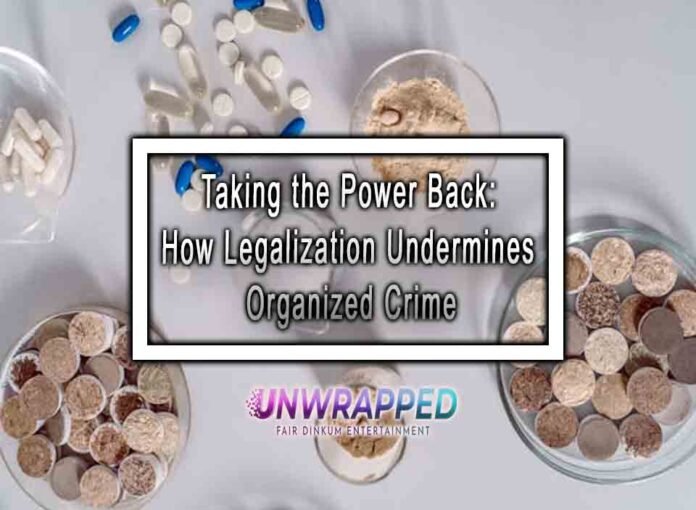The illegal drug trade is a cornerstone of organized crime, generating billions in profits annually and fueling violence, corruption, and exploitation worldwide. Legalizing drugs disrupts these criminal enterprises, stripping them of their primary source of revenue and reducing their influence over communities. By regulating the drug market, governments can take the power back from cartels and criminal organizations, fostering safer societies and cutting off the financial lifeblood of global crime syndicates.
The Role of the Black Market in Organized Crime
The global drug trade is one of the most lucrative black-market industries, with estimated revenues of $426–$652 billion annually (UNODC). These profits fund a wide range of illicit activities, including:
- Human trafficking: Cartels use drug profits to support the trafficking of people for exploitation.
- Weapons smuggling: The drug trade fuels the purchase of illegal arms used in gang violence and conflicts.
- Corruption: Criminal organizations bribe law enforcement, politicians, and judges to maintain their operations.
The Cost to Society
The social and economic toll of organized crime is staggering:
- Increased violence and homicides in communities dominated by the drug trade.
- Destabilized economies and governance in countries where cartels wield significant power.
- Billions spent annually on law enforcement and incarceration, often with limited success.
How Legalization Disrupts the Black Market
1. Redirecting Revenue
When governments legalize and regulate drugs, they create a legal market that competes directly with criminal enterprises:
- Affordable Prices: Legal markets set competitive prices, undercutting the black market.
- Tax Revenue: Instead of funding violence, drug profits contribute to public services like education and healthcare. For example, Colorado has generated over $2 billion in cannabis tax revenue since legalization (Colorado Department of Revenue).
2. Reducing Demand for Illegal Drugs
A regulated market provides safer, more reliable access to drugs, reducing the need for consumers to turn to illicit sources. Legalization in Uruguay, for instance, has significantly reduced illegal cannabis sales (BBC).
Lessons from Countries That Have Legalized Drugs
1. Portugal: Reducing Drug-Related Crime
Portugal’s decriminalization of all drugs in 2001 shifted focus from enforcement to treatment, leading to:
- A significant decrease in drug-related arrests and incarcerations.
- A decline in organized crime linked to the drug trade (Transform Drug Policy Foundation).
2. Canada: Cannabis Legalization
Since legalizing cannabis in 2018, Canada has:
- Reduced black-market activity by offering affordable, high-quality legal products.
- Generated over $15 billion in economic activity, previously controlled by criminal networks (Health Canada).
3. Switzerland: Heroin-Assisted Treatment
Switzerland’s heroin-assisted treatment program offers medical-grade heroin in supervised settings, effectively removing users from the black market:
- Overdoses and drug-related crimes have dropped significantly.
- Organized crime’s role in heroin distribution has diminished (Swiss Federal Office of Public Health).
The Ripple Effect: Undermining Global Cartels
Legalization has implications beyond national borders, disrupting international crime syndicates:
- Cartels Lose Influence: Legal markets in countries like Canada and Uruguay have cut into the profits of cartels supplying those regions.
- Weakened Corruption: By reducing the flow of illegal money, legalization undermines the bribes and coercion that keep cartels powerful.
- Reduced Trafficking: When demand for illegal drugs decreases, trafficking routes become less profitable, reducing human and environmental exploitation.
Addressing Common Concerns
1. Won’t Cartels Just Shift to Other Crimes?
While organized crime may diversify into other illegal activities, drugs represent their most significant source of revenue. Legalization reduces their financial power, making it harder to fund other operations.
2. Will the Black Market Disappear Completely?
A small black market may persist, but legalization can drastically shrink its size and influence:
- Competitive pricing and convenience drive most consumers to legal markets.
- Strict enforcement against unlicensed production ensures the black market remains minimal.
Building a Strong Legal Market
1. Regulation and Oversight
Effective regulation is key to outcompeting the black market:
- Accessible Legal Outlets: Ensure legal drugs are available through licensed retailers in all regions.
- Quality Assurance: Consumers will prefer legal products if they are safer and more reliable than illicit ones.
2. Community Investment
Reinvest tax revenue from drug sales into the communities most affected by organized crime:
- Job Creation: Offer training and employment opportunities in the legal drug industry.
- Social Programs: Fund addiction treatment, education, and housing initiatives to address root causes of crime.
3. International Cooperation
Global crime syndicates operate across borders. Collaboration between nations is essential to dismantle trafficking networks:
- Share intelligence and resources to combat remaining black-market activities.
- Align legalization efforts to prevent displacement of drug-related crime.
Real-World Impacts: Success Stories
1. California’s Cannabis Market
California’s legal cannabis industry generated $5.3 billion in sales in 2021 alone. By providing affordable, high-quality products, the state has significantly reduced illegal sales (California Department of Tax and Fee Administration).
2. The Netherlands’ Cannabis Coffeeshops
The Netherlands’ tolerance model allows regulated sales of cannabis in coffeeshops, keeping the trade away from street dealers and organized crime (Dutch Ministry of Justice).
3. Uruguay’s Cannabis Legalization
Uruguay’s government-controlled cannabis market prioritizes accessibility and affordability, reducing black-market influence without increasing usage rates (Uruguay Drug Observatory).
A Vision for a Safer Future
Imagine a world where:
- Communities are free from the violence and exploitation of cartels.
- Governments reinvest drug revenues into public services, education, and healthcare.
- Individuals no longer risk their lives buying dangerous, unregulated substances.
By legalizing drugs and creating a regulated market, we can weaken organized crime, reduce violence, and foster a safer society. The power is there—waiting to be taken back.
See Also: Addiction is Not a Crime: Re-framing Drug Use as a Public Health Issue










